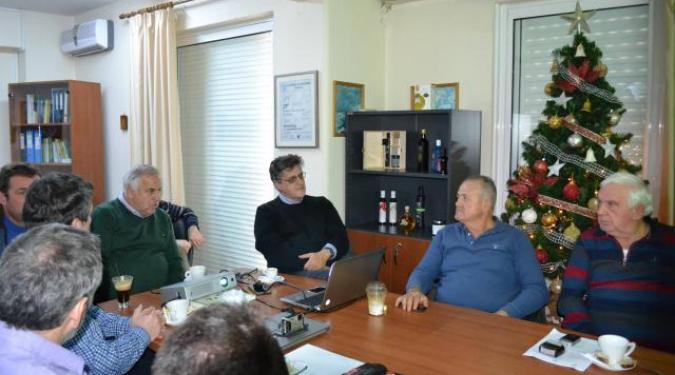At the heart of research projects is Trifylia with its dynamic and modern agricultural crops and yesterday was the launch of a research and innovative project for saving irrigation water in crops. New technologies are a useful tool in the hands of producers, region and state with synergies of the Directorate of Rural Economy and Veterinary of Trifylia (DREV), the Agricultural University of Athens, TEI of Peloponnese, companies and producers! There was a meeting yesterday at the DREV of Trifylia, about the new research project with the professors who have undertaken its implementation. In a statement, Panagiotis Philippopoulos, assistant professor in the department of Computer Engineering at TEI of Peloponnese based in Sparta, noted that, "We are here, in DREV of Trifylia, for the launch of the implementation of a research and innovative project submitted in the framework " Competitiveness, Entrepreneurship and Innovation " recently and received a very good evaluation and in which we two Organizations participate, namely the TEI of Peloponnese and the Agricultural University of Athens , with representative and scientific Director Mr. Stavros Alexandris and three companies specializing in one of them in IT services, the other in unmanned drone helicopters and the third is a business consultant and we also have four producers who are selected with the help of Mr. Paraskevopoulos, who was an aid throughout the preparation of the proposal, as representatives of the province of Trifylia which is very important because it is the second , after Crete, area in the production of horticultural products and for this reason it was chosen in order for us to be able to run this research project which has as its main objective the development of a system for the dynamic planning of irrigation and the saving of irrigation water. A very critical issue whose criticality is intensified by over-pumping due to many boreholes but also the salinization of water which drops the quality. It is therefore very crucial at producer level to be able to have the appropriate tools to regulate irrigation and for economic reasons – to say here that the producer pays an average of EUR 7.5 per hour of pumping, i.e. 40 to 60 cubic meters of water, and this is expected to become more difficult and worse in terms of costs in the coming years – but also at the level of the Region which in this context , obviously, is interested in building a water policy... The aim is to help with the problem of over-pumping and lack of quality irrigation water, to be able to regulate in an accurate and dynamic way the needs of crops, especially those that are water-intensive, which require very large quantities of water like vegetables, potatoes and watermelon here in the region, in order to give the tools to both producers and the state and the Region to develop – so to say – a policy of saving water resources. In turn, Stavros Alexandris, associate professor at the Agricultural University of Athens in the field of water resources, pointed out that, the program we have been called upon to implement is exactly what Mr Philippopoulos told you earlier, to be able to save huge amounts of water which are essentially wasted during irrigation with results not only in fertilizer pollutants entering the aquifers but also being able to reduce water consumption. In your area we will install systems of modern automatic micro-meteorological stations from where we will get all the climatic observations throughout the program. This is a very useful object, for our physical object, because this way we will be able to have all the measurements, all the observations, to observe the needs of the crops in water...". He also referred to aerial observations via drones that will take foliage temperatures from which they will see the actual water consumption of each crop and pointed out that new technologies are a useful tool in the hands of producers as well as the State. Finally, the director of the DREV of Trifylia, Antonis Paraskevopoulos, stressed, among other things, that the aim is to exploit new technologies for the needs of crops in water in an innovative program that applies parameters and sensors for the first time in the region.
ΘΑΡΡΟΣ news (article in greek)Implementation of innovative research project for the irrigation of crops in Trifylia
Implementation of innovative research project for the irrigation of crops in Trifylia
GreenWaterDrone in press

